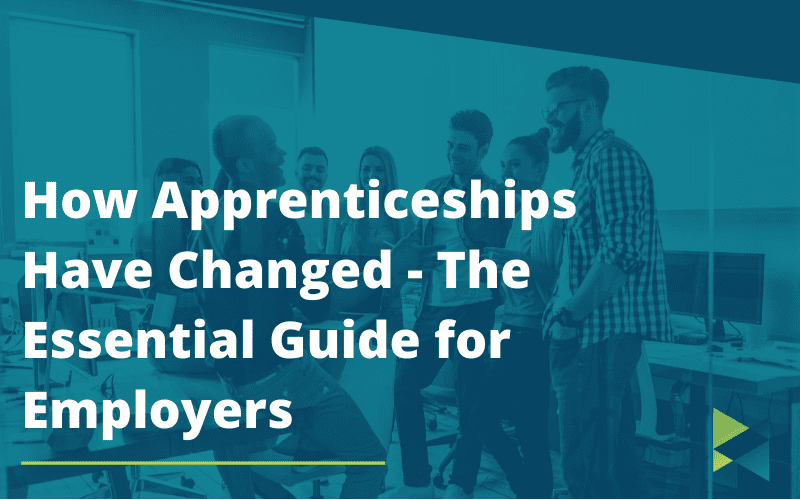In these trying times for business, you may ask yourself, what is the best investment I can make to stimulate growth? No doubt, like other businesses you are looking to adapt and pivot, to come out of the pandemic stronger and more change adverse.
There will be hundreds of options vying to be the answer; the solution to your problems, but allow me to suggest something you may not yet have considered; hiring an apprentice. It’s amazing just how much apprenticeships have changed in the past few years.
Ok, I hear you – The common misconceptions are loud and very much part of the popular discourse, but allow me to alleviate those concerns, and perhaps even surprise you.
The modern apprenticeship in the UK is not just for 16-24 year olds, it doesn’t just cover level 3 qualifications, and it’s not just about practical, physical skills like fixing cars.
Interested to learn more? Read on and I’ll explain just how you can gain a new expert asset to your team, and you may only have to contribute between 0-5% of the costs…
In this article I’ll cover:
- How Have Apprenticeships Changed?
- How Apprenticeships Work in the UK
- Why Might an Apprenticeship be Better than University?
- How Apprenticeships Benefit Employers
- How Apprenticeships are Funded
- How to Get Started With Hiring an Apprentice
So How Exactly Have Apprenticeships Changed in the UK?
Let’s get straight to the point at hand, apprenticeships are now a real game changer and a huge potential asset to businesses of any size. They’re for all ages, and can be used both for those who need to learn a skill from scratch, and for staff who need to upskill in the industry they already know.
Apprenticeships are now available from levels 2-7, that’s from GCSE level to a Master’s Degree, and there are over 500 apprenticeships now approved for delivery, meaning the potential qualifications available will likely cover whatever your business needs, from digital marketing to textile care and beyond.
Previously, apprenticeships received a lot of stigma that was unfounded, many would see them as underpaid work and employers would see them as a waste of time, but that couldn’t be further from the truth – especially with recent government changes to the way apprenticeships are run coming into effect in the past ten years.
Now candidates who would ordinarily head straight for university are seeing the temptation of earning as they learn, avoiding the ever-rising tuition fees and student loans that will follow them for life. The appeal of learning practical skills and having a good chance of a permanent job at the end means many can’t help but see the logic in taking an apprenticeship.
For employers, that means they can have a committed candidate with the company right from the start, that can receive tailored training that’s relevant and up-to-date with the latest industry thinking.
As we’ve mentioned before, employers can even upskill their current staff with apprenticeships, so you can reward loyalty with training. These days, staff that stay in a role for life can be a far-fetched concept, but by investing in their potential, you might unlock the secret to avoiding high staff turnover.
I’ll end this section with some food for thought – does investing in perkboxes, meals and a fancy office make your staff happy and productive? Or will giving them self-actualisation and a chance at professional development delight them better in the long run?
How do Apprenticeships Work in the UK?
Now you’re aware of how apprenticeships have changed for the better, you might be interested to know how they now work in the UK.
You can take on an apprentice at any age over 16, and the apprenticeship must provide work alongside studying. Your apprentice’s study time needs to make up 20% of their working week, so that’s usually one day with a training provider, like ourselves, if they’re working full time.
Some of that 20% can even be made up by training in the work environment. It’s not a lot to sacrifice out of their productivity, and the skills they learn will help them to become more engaged and involved with their role.
As a minimum, apprenticeships in the UK should last a year, but they can last up to five years if you want to give your apprentice plenty of time to study towards a higher level, like a master’s.
Hiring an apprentice is no hassle for your company at all, in fact the government are making purposeful changes to ensure it’s easier than ever to create a new apprentice role or put your staff into an apprenticeship.
Clearly, they believe apprenticeships are a huge benefit to the economy, so it’s no surprise that there are plenty of apprenticeship incentives for employers to boost the market post-COVID.
There’s never been a better time to take on an apprentice – they’re more cost effective than ever before for businesses of any size, whether you’re a start-up or a national company turning over millions.
Using Apprenticeships To Upskill Your Staff
One of the most common misconceptions about apprenticeships is that they’re only for new starters – however, you might be surprised to learn that you can use apprenticeships to upskill anyone on your team.
Not only that, but you’re still eligible for funding and grants in doing this, so apprenticeships can be a really cost-effective way to train and develop your staff.
In the current climate, it’s easy to see why it’s important to diversify the skills of your staff. If the COVID-19 crisis has taught us anything, it’s that businesses who are more willing to adapt and pivot are the ones who survive and come out the other side stronger.
Why not give your staff some digital marketing skills so they can help market your business online? Or identify the future leaders in your company and put them through a management and leadership apprenticeship.
You could even give administration staff financial management skills using a business administration apprenticeship, meaning you need fewer members of staff to keep the business running, should you ever have to make staff furloughed, quarantined or if they’re ever off unwell. You can just continue running as normal!
Diversifying staff skills can make your business disaster-proof. Just take a look at these essential apprenticeships for business growth during a pandemic.
Is an Apprenticeship Better than a University Degree?
Ok, confession time, the writer of this article is a millennial. Hence I’m prone to dangerously progressive thoughts (and a cliche love of avocados).
I’m here to ask, that as an employer you consider that an apprenticeship on someone’s CV might be just as effective, if not better, than a degree on someone’s CV.
Don’t get me wrong, university learning is a blessing in this country and we’re very lucky to have so many great institutions on our doorstep, but let’s take a look at the facts for a moment.
According to Times Higher Education, the average undergraduate degree cost learners £27,000 in 2020. Unfortunately, that’s before the costs of maintenance loans and any extra borrowing students might need to take out for the cost of living and accommodation. The true total is approximated to be around £35,000 to £40,000.
The cost of living in the past few decades has risen astronomically, so it’s clear to millennials, Gen-Z, and even the generations before them, that starting your adult life drowning in debt, with no hopes of being able to put down a deposit on a house, perhaps isn’t the best decision anymore.
If your business is just relying on university candidates to come knocking, you could be missing out on a huge potential talent pool, as more and more frequently people are opting for a paid training route, rather than a degree.
Even earlier generations who are in employment can struggle to rationalise spending several thousand pounds from savings they don’t have to upskill themselves.
It’s a no-brainer to some, when they are faced with university bills versus being paid to learn. By the time someone has completed a three year university degree, an apprentice can realistically have graduated, be employed full-time and be promoted from their original apprentice role.
Apprentices also have a major advantage over their competitors; they have real-world work experience in the industry. An apprentice may take extra time to train initially, but they’ll soon become an expert in your business and won’t need to adjust to your way of working.
It’s also true that some industries are so dynamic and changing (marketing, finance and technology to name a few) that it’s entirely believable that something learned three years ago during a degree can be out of date right now. Apprentices, sitting on the front line, will not have this problem to face.
We really believe that to employers, this way of thinking should be a real aspect of their strategy in the 2020s.
How Apprenticeships Benefit Employers
I’m sure in reading this article to this point, you’re already starting to become enlightened about apprenticeships.

That said, we’d like to hammer home the point with some hard statistics and fascinating facts to back up our claims:
- According to the Chamber of Training, an apprentice boosts productivity to a business by an average of £214 a week.
- 90% of apprentices stay in employment after completing their apprenticeship.
- Even in the unlikely event an apprentice doesn’t stay with your company, the widespread adoption of apprentices across an industry will help to flood the recruitment market with highly skilled candidates for the future…
- …Which is extremely beneficial for industries who are seeing skills in their sector dying out.
- 1 in 5 companies have a former apprentice at board level.
- Employers say qualified apprentices are up to 15% more employable with direct skills compared to those with other qualifications.
- Around 80% of employers reported that taking on apprentices reduced staff turnover.
- 77% of employers have reported that they believe apprenticeships make them more competitive.
- Furthermore, according to the National Apprenticeship Service “data has shown that 81% of consumers favour using a company that takes on apprentices”
There’s a monumental pool of data that goes to show apprenticeships increase staff loyalty, help businesses expand on the skills of their staff and boost business output and productivity.
It’s clear to us, as advocates for the potential of apprenticeships for more than a decade, that buying into the apprenticeship scheme may be one of the single most effective investments you can make to grow your business.
How Apprenticeships are Funded
Now you may be asking, “That’s all very well and good, but how much will an apprenticeship cost my business?”
It’s a valid concern, but as we’ve said before, there’s no time like the present for investing in an apprentice – the incentives and funding available make taking on an apprentice a piece of cake – we promise, you won’t be spending hours justifying your decision to the finance team!
We’ve created a simple chart below to show you how funding an apprentice will work for your business.
(Funding bands correct as of September 2020, we’ll update this table as and when government changes to funding are issued.)
The Government Plan For Jobs Apprenticeship Incentive Payment
Designed to encourage employers to take on an apprentice and boost the economy post-COVID, this incentive payment is awarded to employers in two parts; half will be paid at day 90 of your apprentice’s learning, and the remainder will be paid at day 365.
The apprentice’s employment start date must be between 1st August 2020 and 31st January 2021 to qualify. There is no limit to the number of incentive payments an employer can claim for eligible apprentices.
| Apprentices aged 16-24 | £2000 |
| Apprentices aged 25 and over | £1500 |
There’s also an extra £1000 boost available for apprentices aged 16-18!
Funding for Employing an Apprentice in the UK
When it comes to funding an apprentice, the key thing to consider is whether your business pays the apprenticeship levy. Your business will pay the levy if it has over £3million a year on payroll.
| If you pay the levy | You will be able to access the funds you’ve paid for the levy in a pot through the apprenticeships service. You have 24 months to spend them once they have entered your account. |
| If you do not pay the levy | You’ll only need to contribute between 0 and 5% towards the training of your apprentice, and you will pay this on a payment schedule to your training provider. The government will cover the remaining 95%, which is paid directly to your training provider, up to a maximum funding band, which depends on the type of apprenticeship. |
There may even be extra funding available, which will depend on the circumstances of your business and your apprentice.
Getting Started with Hiring an Apprentice
Ready to explore the world of apprenticeships?
Your first step will be to speak to a recognised training provider. They can give you all the best, tailored advice for your situation in a no-obligation way.
Here at NTG we are a recognised training provider for apprenticeships in:
- Customer Service
- Business Administration
- Digital Marketing
- Textile Care
- Team Leadership
- Manufacturing
- Warehouse Operation
- Business Improvement
- Operations
- Learning and Development
- Adult Care
And there’s more to come.
If you’d like to speak to one of our friendly team, why not send us an inquiry today?
—
If you have any more questions, we’ve got a comprehensive FAQ page that answers all the most commonly asked queries, or you can contact us on Facebook or Live Chat for a quick response if your question isn’t covered!
—-
We hope this article has helped to enlighten you about the benefits of apprenticeships, why not leave a comment below with a question or share with others how an apprentice has benefited you. We’d love to hear your story!






